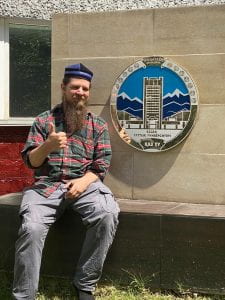
Adam Willson in front of Kazakh National University, Almaty, where he spent his weekday mornings learning Russian. American Councils’ RLASP just celebrated the 10th year anniversary of their collaboration with KazNu.
Adam Laten Willson, Doctoral Student, Slavic Languages and Literatures
Anyone who has stuck with a foreign language long enough, will at some point encounter the dreaded language “plateau”, where progress feels so infinitesimal it barely feels like anything at all. After studying Russian in Western institutions for 4 years, I knew I had to get abroad as soon as possible, so that I could improve my language skills in a native Russian-speaking environment.
I am particularly fortunate to have found American Councils’ Advanced Russian Language and Area Studies Summer Program in Almaty, Kazakhstan. I have been fascinated by Central Asian culture for more than 20 years. In my early twenties, I started reading about Central Asia, and even found a website with hundreds of Turkmen pop songs (back in the days of mp3s!). I was instantly transfixed. It was like communing with a world, a culture, a way of life so foreign to anything I had ever encountered before, and absolutely captivating. Fast forward to today. I am now a graduate student at Northwestern and am blessed with the opportunity to research Central Asian literature and culture for a living.
Not only did RLASP’s 8-week summer session significantly advance my automatic use and comprehension of Russian. It provided me with a unique experience to acquaint myself with the history and culture, as well as the everyday experience, of contemporary Kazakhstan. In addition to 24 hours of immersive language instruction, as well as group excursions, every week, I took full advantage of my life in Almaty to explore as many facets of the city as possible.
I visited five museums, saw 3 plays (one in Russian, two in Kazakh), went to the mountains 6 times, watched a football match (Almaty’s team – Qairat – won!), went to the banya, attended a panel on Post-colonial Kazakh art, researched at the National Library, explored the city’s diverse ethnic cuisine, and spent countless hours walking the streets, surveying all I could of my new home.
I am a natural wanderer and my long walks through Almaty will persist as some of my fondest memories. My first and lasting impression of Almaty was that it wore its culture proudly, much more so than most cities where I had lived. Almost every street is named after some cultural figure, some poet, akyn (traditional Kazakh bard), composer, educator, hero. Everywhere residents are reminded of their national history by parks, squares, alleys, monuments, and various cultural and historical institutions, bearing the traces of hundreds of years of heritage, deeply woven into the everyday fabric of modern, cosmopolitan Almaty.
Almaty provided me with incomparable opportunities to improve my Russian language use. In addition to my instruction at Kazakh National University, where the small class sizes allowed instructors to cater the material to our individual needs, as well as the indispensable advantage of a home-stay and American Council’s robust cultural literacy program, the program’s efficacy was amplified by Almaty’s linguistically diverse setting and the overflowing hospitality and openness of Almaty’s residents.
Almaty, the former capital of the Soviet Kazakh Republic, now the largest Kazakh city in terms of population, is a center of great cultural, ethnic, and architectural diversity. One of my favorite components of RLASP’s classroom instruction was two weekly lectures on Kazakh politics and cultural history. For me, the point was really driven home just how variegated Kazakh history and national identity is. For centuries, Almaty has been home for all kinds of culture, ethnicity, religion, worldview, and life practice, as a major global thoroughfare in the days of the Silk Road, as well as a cosmopolitan hub under the Soviet Union. Now, as Kazakhstan continues to define its unique profile as an influential participant in the global forum, the traces of its many historical legacies live on in the variety of Almaty’s architecture and urban planning, in the multicultural composition of its population, and in the range of conversations one encounters in the street.
Everywhere I met residents from all walks of life who showed a genuine interest in the motivations that brought me to Almaty, if not a little surprise that I would want to learn Russian in Kazakhstan. I quickly began to pick up new vocabulary and constructions that I could never have learned from textbooks, but only from native speakers, from street-signs and grocery shelves, from public transport, through osmosis. Before long I was holding thorough conversations about literature, history, politics with my fellow students, conversation partners, and hosts, and it all began to seem familiar and automatic. Like I had been in Almaty much longer than I actually had.
When we first arrived, we were advised by the program directors to make the most of our time, to take initiative and search for opportunities to build upon our classroom lessons with lived experience. I certainly took this advice to heart and threw myself into a slew of new experiences in my target language, as my instantaneous love for the city gradually grew into a deep feeling of belonging, half a world away. I’m currently developing an application to study in Kazakhstan for a full year and am positively animated by the prospect of returning to such an enchanting place, and learning even more about this fascinating country and its inhabitants.
